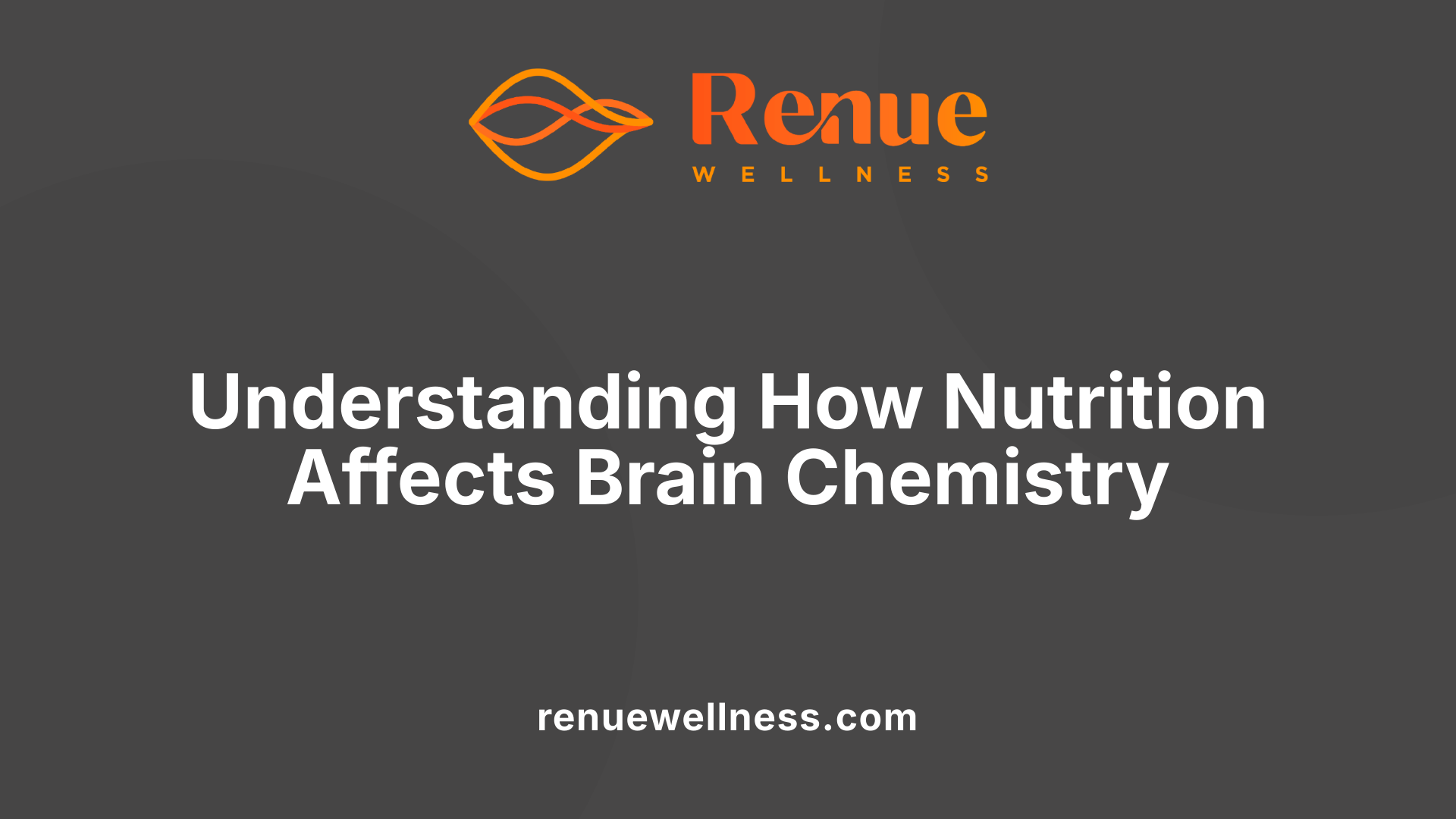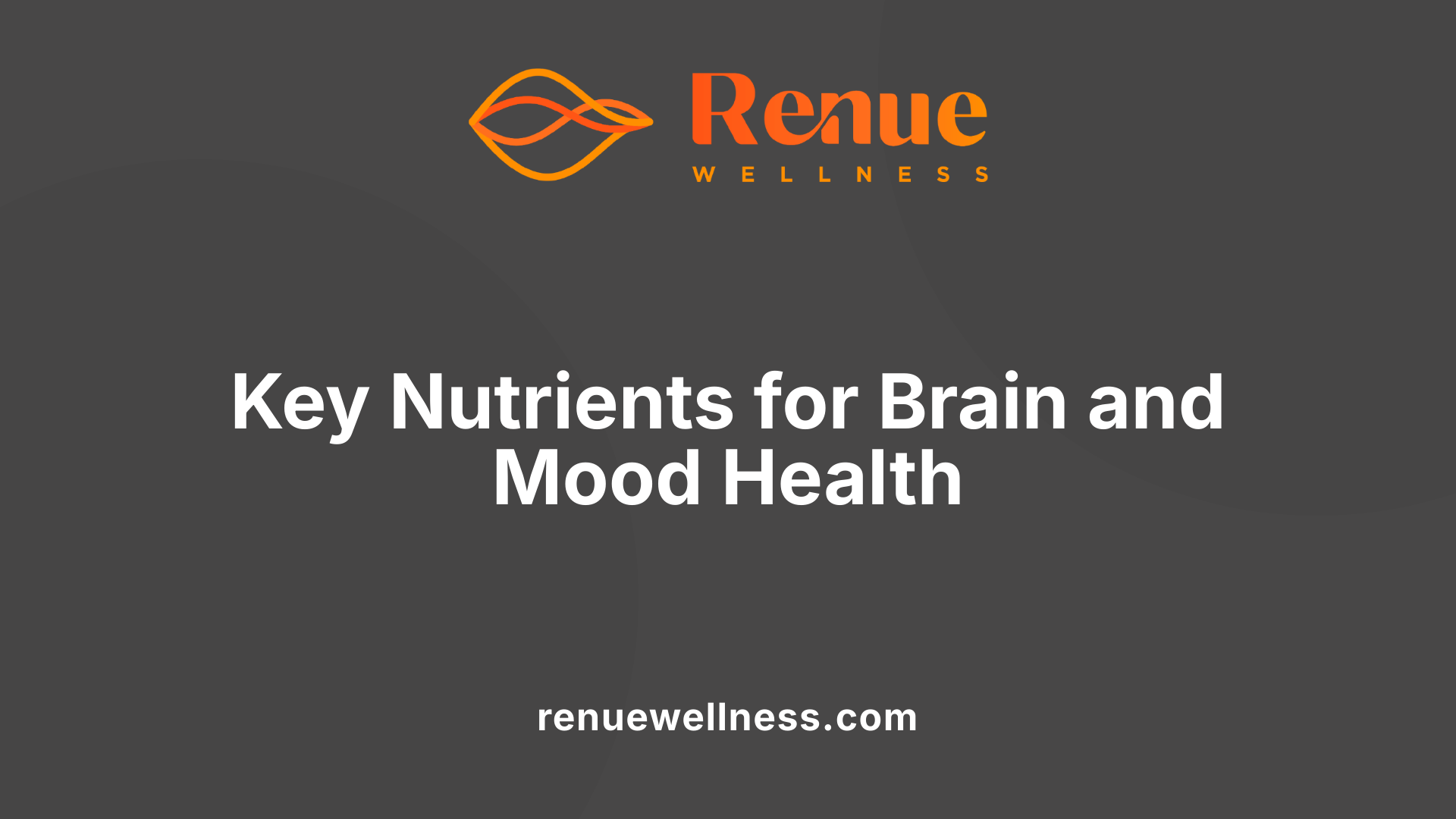How Nutritional Deficiencies Affect Mental Health Recovery


August 21, 2025
Understanding the Critical Link Between Nutrition and Mental Health Recovery
Nutrition plays a pivotal role in mental health by influencing brain function, neurotransmitter synthesis, and inflammatory processes. As research advances in fields like nutritional psychiatry, it becomes increasingly clear that addressing dietary deficiencies is essential for effective mental health recovery. This article explores how various nutritional factors impact mental health, the biological mechanisms involved, and practical dietary strategies to support mental well-being.
The Impact of Poor Nutrition on Brain and Mental Health
Blood sugar fluctuations and mood instability
Inadequate or poorly timed food intake can cause significant blood sugar swings, leading to mood swings, irritability, and fatigue. When blood glucose levels spike and plummet rapidly, they set off hormonal responses that can impair mental clarity and emotional stability. This rollercoaster effect is often found in diets high in refined sugars and processed carbs, contributing to symptoms of depression and anxiety over time.
Maintaining steady blood sugar levels through balanced meals rich in fiber, protein, and healthy fats helps stabilize mood and cognitive function. Whole grains, nuts, seeds, and vegetables release energy slowly, preventing the peaks and troughs associated with hyperglycemia and hypoglycemia. Proper hydration is also crucial, as dehydration can further impair mental performance and emotional regulation.
Inflammation and brain function impairment
Chronic inflammation is a common feature linked to unhealthy eating patterns, especially those high in saturated fats, sugar, and additives. This inflammation can cross the blood-brain barrier, impairing neural circuits involved in mood regulation and cognition. Over time, sustained neuroinflammation contributes to the development of depression, cognitive decline, and neurodegenerative diseases.
Nutritional strategies that reduce inflammation include consuming antioxidant-rich foods like berries, leafy greens, and spices such as turmeric. Healthy fats from fish, olive oil, and nuts are also anti-inflammatory. These foods support the production of neuroprotective compounds like brain-derived neurotrophic factor (BDNF), which enhances neuroplasticity.
Gut microbiota and mental health
The gut-brain axis is a bidirectional communication pathway where gut bacteria influence brain function and mood. A diverse and balanced microbiome, fostered by fiber-rich foods, fermented products, and prebiotics, correlates with fewer symptoms of depression and anxiety.
Disruptions in gut microbiota, often caused by poor diets high in processed foods or antibiotics, can decrease the production of mood-supporting neurotransmitters such as serotonin and GABA. This imbalance promotes neuroinflammation and impairs neural signaling.
Recent studies highlight the role of probiotics in restoring microbial diversity, which may reduce depressive symptoms and improve cognitive function. Including foods like yogurt, kefir, sauerkraut, and fiber-dense plant foods can support gut health and, consequently, mental well-being.
| Aspect | Impact | Dietary Recommendations |
|---|---|---|
| Blood Sugar & Mood | Fluctuations cause mood swings | Balance meals with complex carbs, protein, fats |
| Inflammation | Promotes depression & cognitive decline | Eat antioxidant-rich & anti-inflammatory foods |
| Gut Microbiome | Affects neurotransmitter production | Include prebiotics, probiotics, fiber-rich foods |
Understanding how diet influences mental health through these interconnected pathways emphasizes the importance of nutritious choices. Improving nutritional habits supports stable moods, cognitive resilience, and emotional strength, contributing to overall psychological well-being.
The Biological Mechanisms Connecting Nutrition and Mental Health

How does proper nutrition support neurotransmitter production?
Proper nourishment provides the essential building blocks required for the synthesis of neurotransmitters, which are chemicals that regulate mood, cognition, and overall mental health. Amino acids like tryptophan and tyrosine serve as precursors for serotonin and dopamine, respectively, facilitating the production of these mood-stabilizing neurochemicals. Vitamins such as B6, B12, and folate are vital in the neurochemical synthesis and metabolic pathways that maintain neurotransmitter balance.
Omega-3 fatty acids, especially EPA and DHA, influence gene expression and promote neuroplasticity—brain's ability to adapt and form new connections—which supports efficient neurotransmission. Minerals like magnesium and zinc further modulate nerve function and can reduce neuroinflammation, creating a favorable environment for neurotransmitter activity. Together, these nutrients sustain the production, regulation, and functioning of neurotransmitters essential for stable mental states and emotional resilience.
What role does inflammation play in mental health, and how can diet influence this?
Inflammation has been increasingly recognized as a central factor in various mental health disorders, including depression, bipolar disorder, and obsessive-compulsive disorder (OCD). Chronic systemic inflammation and neuroinflammation damage brain cells, impair synaptic function, and disrupt neurochemical signaling, leading to mood disturbances and cognitive deficits.
Diet plays a significant role in modulating inflammation levels. Unhealthy dietary patterns high in saturated fats, refined sugars, trans fats, and additives tend to promote systemic inflammation. Conversely, diets rich in anti-inflammatory foods—like the Mediterranean diet—embody healthy fats, abundant antioxidants, and dietary fiber, which collectively decrease inflammation.
Nutrients such as omega-3 fatty acids, vitamin E, and polyphenols from fruits, vegetables, nuts, and olive oil are known to modulate inflammatory responses. These compounds help regulate immune activity and reduce oxidative stress in the brain, thereby protecting neurons from inflammatory damage. Maintaining a diet that emphasizes these anti-inflammatory elements can lead to improved mental health by lowering neuroinflammation and supporting brain resilience.
How does the gut microbiota influence mental health and how can nutrition modulate this?
The gut microbiota, which consists of trillions of microorganisms living in our intestines, plays a crucial role in mental health through the gut-brain axis—a bidirectional communication network. Gut bacteria produce and regulate neurotransmitters such as serotonin, gamma-aminobutyric acid (GABA), and dopamine, all of which are fundamental in mood regulation and cognitive functions.
A diverse and balanced microbiome is associated with fewer symptoms of depression and anxiety. Nutritional strategies that support gut health include consuming prebiotics—fibers that feed beneficial bacteria—found in foods like garlic, onions, and asparagus. Fermented foods such as yogurt, kefir, and sauerkraut provide probiotics, which introduce beneficial bacteria directly into the gut.
Omega-3 fatty acids and polyphenols (found in berries, green tea, and colorful vegetables) further enhance microbiome diversity and reduce neuroinflammation. Conversely, a diet high in processed foods, sugars, and additives can disrupt gut microbiota balance, increase inflammation, and impair neurotransmitter production.
Supporting a healthy microbiome through varied, nutrient-rich foods promotes better gut-brain communication and, ultimately, more stable mental health. Disruptions caused by poor diet or antibiotics can negatively influence mood and cognition, emphasizing the importance of nutrition in maintaining gut and brain health.
| Aspect | Role in Mental Health | Nutritional Support | Additional Notes |
|---|---|---|---|
| Neurotransmitter Production | Regulates mood, cognition, and emotion | Amino acids (tryptophan, tyrosine), B vitamins, omega-3s | Supports synthesis of serotonin, dopamine, GABA |
| Inflammation & Neuroinflammation | Damages brain cells, impairs neurocommunication | Omega-3s, antioxidants, fiber-rich diets | Reduces inflammation, oxidative stress, promotes neuroprotection |
| Gut-Brain Axis & Microbiota | Influences neurotransmitter levels, mood | Prebiotics, probiotics, diverse plant foods, omega-3s | Improves microbiome diversity, reduces neuroinflammation |
Understanding these biological mechanisms highlights the importance of a balanced diet rich in specific nutrients to maintain mental health and prevent neuropsychiatric disorders, illustrating the profound connection between what we eat and how we feel.
Dietary Patterns and Their Effects on Mental Wellness

What dietary patterns are associated with improved mental health?
Research has consistently highlighted the positive impact of certain dietary patterns on mental health. The Mediterranean diet stands out as one of the most beneficial, characterized by high consumption of fruits, vegetables, legumes, whole grains, nuts, olive oil, and fatty fish. These foods are rich in omega-3 fatty acids, antioxidants, and essential vitamins and minerals, all of which contribute to reducing neuroinflammation, supporting neuroplasticity, and encouraging healthy neurotransmitter function.
Similarly, the MIND diet, a variation of the Mediterranean pattern, emphasizes berries and leafy greens. These foods are packed with antioxidants and nutrients that bolster brain health and combat oxidative stress.
In contrast, diets high in processed foods, trans fats, refined sugars, and additives—commonly termed Western diets—are linked to increased risks of depression, cognitive decline, and neuropsychiatric disorders. These unhealthy dietary habits promote inflammation and disrupt gut microbiota, negatively affecting mood and cognitive function.
Emerging dietary approaches such as Nordic and plant-based diets, which focus on whole foods, minimal processing, and sources of omega-3 fatty acids from seeds and nuts, also support mental wellness. These diets promote brain health by supplying essential nutrients and reducing inflammatory processes.
Below is a comparison of major dietary patterns and their impact on mental health:
| Dietary Pattern | Characteristics | Effects on Mental Health | Additional Notes |
|---|---|---|---|
| Mediterranean Diet | Olive oil, nuts, fish, vegetables, whole grains, herbs | Reduces depression risk by supporting neuroplasticity and reducing inflammation | Consistently linked to lower rates of depression and cognitive decline |
| MIND Diet | Berries, leafy greens, nuts, fish | Supports brain function, reduces stress and depression symptoms | Designed to slow cognitive decline in aging populations |
| Nordic Diet | Whole grains, root vegetables, berries, fatty fish | Promotes brain health, anti-inflammatory effects | Emphasizes local, minimally processed foods |
| Plant-Based Diets | Legumes, nuts, seeds, vegetables, fruits | Enhances mood, reduces inflammation, improves gut health | May require supplementation of B12 and omega-3s |
| Western Diet | Fast foods, processed snacks, sugary drinks | Increases risk of depression, anxiety, and neurodegeneration | High in trans fats, refined carbs, and additives |
How does adherence to a Mediterranean diet lower depression risk?
Adhering to a Mediterranean diet can significantly lower the risk of depression, with studies showing about a 42% reduction among adherents. The diet’s focus on nutrient-rich foods plays a crucial role in this benefit.
Firstly, olive oil, a staple of the Mediterranean diet, provides anti-inflammatory monounsaturated fats and polyphenols that protect neurons from oxidative damage. Fish, especially fatty fish like salmon, supplies DHA and EPA—omega-3 fatty acids essential for maintaining cell membrane integrity in the brain.
Additionally, fruits and vegetables rich in antioxidants help combat oxidative stress, a known factor in depression. Berries and leafy greens contain high levels of polyphenols, flavonoids, and vitamins that support neurogenesis and neurotransmitter synthesis.
Nuts and seeds offer magnesium, zinc, and essential fatty acids that assist in regulating mood and reducing inflammation. Whole grains provide stable energy and support blood sugar regulation, which benefits mood stability.
Finally, the diet promotes healthy gut microbiota, which influences mental health via the gut-brain axis, producing neurotransmitters like serotonin that regulate mood.
Overall, the combined effects of these nutrient-dense components help improve emotional resilience, cognitive functioning, and mood stability, making the Mediterranean diet a sustainable strategy for mental health support.
Nutrients Essential for Brain Function and Mood Regulation

Why are omega-3 fatty acids important for mental health?
Omega-3 fatty acids, particularly DHA (docosahexaenoic acid) and EPA (eicosapentaenoic acid), are vital for maintaining optimal brain structure and function. These fats influence neurotransmission, gene expression, and neurogenesis, which are critical processes for mood regulation and cognitive performance. Research shows that higher intake of omega-3s correlates with fewer symptoms of depression and improved ability to resist stress.
Additionally, omega-3s have anti-inflammatory properties that help reduce neuroinflammation—a process linked to various mental health disorders such as depression and bipolar disorder. Sources rich in omega-3s include fatty fish like salmon, mackerel, and sardines, as well as plant-based options such as flaxseeds, walnuts, and chia seeds. Consuming adequate amounts of these fats is essential for supporting mental well-being and preventing cognitive decline.
How do B vitamins, especially B6, B12, and folate, contribute to mental health?
B vitamins play crucial roles in neurotransmitter production, neuroplasticity, and methylation—the biochemical processes necessary for brain health. Particularly, vitamins B6, B12, and folate are integral to synthesizing serotonin, dopamine, and norepinephrine, chemicals that regulate mood and emotional stability.
Deficiencies in these vitamins can lead to decreased neurotransmitter synthesis, resulting in symptoms like depression, irritability, fatigue, and cognitive impairment. Folate, for example, helps reduce homocysteine levels, which are associated with inflammation and neurodegenerative diseases. Ensuring sufficient intake through diet or supplementation supports emotional resilience, aids in recovery from mental health conditions, and promotes overall cognitive function.
What is the significance of vitamin D in mental health?
Vitamin D influences the synthesis of serotonin and other neurotransmitters involved in mood regulation. Deficiency in vitamin D has been linked with increased depression scores and a higher risk for mood disorders. Sunlight exposure naturally stimulates vitamin D production in the skin, but many individuals, especially those in higher latitudes, may require supplements.
Adequate levels of vitamin D are also associated with better cognitive performance, neuroprotection, and reduced risk of neurodegenerative conditions. Ensuring sufficient vitamin D intake, whether through sunlight, diet, or supplements, is crucial in supporting mental and emotional health.
Which minerals support mental health and how?
Minerals such as magnesium, zinc, and selenium are essential for healthy brain functioning. Magnesium supports nerve conduction, helps regulate stress responses, and promotes quality sleep. Low magnesium levels are often linked to increased anxiety and depression.
Zinc influences neuroplasticity and neurotransmitter activity. Deficiency can impair mood and cognitive function, increasing vulnerability to depression. Selenium acts as an antioxidant, reducing oxidative stress that can damage brain cells. A balanced intake of these minerals from foods like leafy greens, nuts, seeds, shellfish, whole grains, and eggs helps maintain a resilient neural environment and enhances overall mental wellness.
Why are amino acids important for mental health?
Amino acids, the building blocks of proteins, are essential for creating neurotransmitters such as serotonin, dopamine, and GABA—chemicals that regulate mood, stress, and emotional stability. Foods rich in amino acids, including poultry, eggs, dairy products, legumes, and soy, support the synthesis of these mood-regulating neurotransmitters.
Proper amino acid intake ensures that the brain maintains a stable chemical balance necessary for focus, calmness, and resilience to stress. Supplements like tryptophan, an amino acid precursor to serotonin, are also used to help increase serotonin levels, further supporting mental health and alleviating symptoms of depression and anxiety.
| Nutrient | Main Food Sources | Functions in Mental Health | Additional Notes |
|---|---|---|---|
| Omega-3 fatty acids | Fatty fish, flaxseeds, walnuts, chia seeds | Reduce inflammation, support neurogenesis, improve mood | Anti-inflammatory, supports cognitive decline prevention |
| B vitamins (B6, B12, folate) | Leafy greens, whole grains, eggs, legumes, dairy | Neurotransmitter synthesis, neuroplasticity, methylation | Deficiencies linked to depression and irritability |
| Vitamin D | Sunlight, fatty fish, fortified foods | Mood regulation, neuroprotection | Supplementation helpful in deficient individuals |
| Magnesium, Zinc, Selenium | Nuts, seeds, shellfish, leafy greens, grains | Support nerve conduction, reduce oxidative stress | Deficiencies common in mood disorders |
| Amino acids (tryptophan, tyrosine, phenylalanine) | Poultry, dairy, legumes, soy | Synthesis of serotonin, dopamine, GABA | Supports emotional stability and stress resilience |
In summary, maintaining a diet rich in these nutrients is essential for supporting brain health, stabilizing mood, and reducing the risk of mental health disorders. Balanced nutrition, with emphasis on nutrient-dense foods like oily fish, leafy greens, nuts, seeds, and whole grains, can profoundly influence overall mental well-being and resilience.
Influence of Dietary Fats on Brain Health and Mood

What are the benefits of healthy dietary fats?
Healthy fats, particularly omega-3 fatty acids, play a vital role in maintaining optimal brain function and mental well-being. Found abundantly in fatty fish like salmon and mackerel, as well as plant sources such as flaxseeds, chia seeds, walnuts, and algae, these fats are integral components of neuronal membranes. They help preserve membrane fluidity, which is crucial for effective neurotransmission.
Moreover, omega-3s possess anti-inflammatory properties that reduce neuroinflammation—a process implicated in depression, anxiety, and neurodegenerative disorders. Adequate intake of DHA (docosahexaenoic acid) is concentrated in the central nervous system and is essential for brain development and cognitive functions. Studies consistently link higher omega-3 consumption with lower incidences of depression, improved mood stability, and better cognitive resilience.
Incorporating these healthy fats into one's diet supports neuroplasticity, enhances neurotransmitter production (like serotonin and dopamine), and contributes to overall brain health. This balance promotes mental resilience, reduces stress sensitivity, and helps manage or prevent mental health disorders.
How do unhealthy fats impact mental health?
In contrast, diets high in unhealthy fats—especially trans fats and excess saturated fats—are detrimental to mental health. Commonly found in processed foods, fried items, baked goods, and fast foods, these fats can trigger systemic inflammation that extends to the brain. Chronic neuroinflammation hampers neurotransmitter activity and damages neuronal structures, impairing cognitive processes and emotional regulation.
Research indicates that diets rich in trans fats and saturated fats are associated with an increased risk of depression, cognitive decline, and even neurodegenerative diseases such as Alzheimer’s disease. These fats also interfere with the production of essential neuroprotective mediators.
Reducing the consumption of unhealthy fats and replacing them with healthy alternatives is crucial for mental health. Prioritizing diets that limit trans fats and saturated fats while emphasizing omega-3 rich foods supports better mood regulation, cognitive health, and reduces the risk of mental illness.
| Nutrient Source | Type of Fats Present | Impact on Brain and Mood | Additional Notes |
|---|---|---|---|
| Fatty fish (salmon, mackerel) | Omega-3 fatty acids (EPA & DHA) | Supports neuron health, reduces inflammation, improves mood | Recommended at least 2 servings per week |
| Flaxseeds, chia seeds, walnuts | Plant-based omega-3s (ALA) | Converts to EPA and DHA, supports brain plasticity | Suitable for vegetarians and vegans |
| Processed foods, fried foods | Trans fats, high saturated fats | Promotes inflammation, impairs neurotransmitter function | Limit or avoid to support mental health |
Additional Insights
Emerging research highlights the importance of dietary balance between omega-6 and omega-3 fatty acids. A high omega-6 to omega-3 ratio, typical in Western diets, can promote inflammatory processes linked to depression and anxiety.
Furthermore, supplementation with high doses of EPA has shown efficacy in treating depressive symptoms. Ongoing clinical trials investigate the benefits of omega-3 supplements in neurodegenerative and neuropsychiatric conditions.
Supporting brain health also involves a holistic approach, including adequate intake of other nutrients such as B vitamins, magnesium, and antioxidants, all of which work synergistically with healthy fats to optimize mental well-being.
In summary, emphasizing nutrient-rich sources of healthy fats while reducing intake of unhealthy fats can significantly influence mental health outcomes, improve mood stability, and protect against cognitive decline.
Nutritional Strategies to Support Mental Health Recovery

What dietary strategies benefit mental health recovery?
Adopting dietary patterns known for their neuroprotective and anti-inflammatory properties can significantly support mental health recovery. The Mediterranean diet, rich in fruits, vegetables, legumes, nuts, olive oil, and fish, has been associated with decreased symptoms of depression and improved cognitive function. Similarly, the MIND diet combines elements of the Mediterranean and DASH diets, emphasizing berries and leafy greens, which are rich in antioxidants and nutrients like folate and magnesium.
Consistency in meal timing and maintaining proper hydration are essential components. Regular meals prevent blood sugar fluctuations that can destabilize mood and energy levels. Staying well-hydrated helps sustain optimal brain function and mood regulation.
Incorporating nutrient-dense foods such as leafy greens, berries, whole grains, fermented foods (like yogurt and kefir), and healthy fats supports gut health and, consequently, mental well-being. This is based on the gut-brain axis concept, where a diverse gut microbiome influences mood by producing neurotransmitters like serotonin.
Reducing intake of processed foods, high in saturated fats, trans fats, and added sugars, diminishes systemic inflammation, which is linked to depression and anxiety. It also prevents the buildup of neurotoxic compounds that can impair cognition.
Are special supplements recommended for mental health?
While obtaining nutrients from a balanced diet remains optimal, supplementation can play a supportive role, especially when dietary intake is insufficient or in cases of specific deficiencies. Nutrients such as omega-3 fatty acids (EPA and DHA), B vitamins (particularly B12 and folate), vitamin D, magnesium, and zinc have shown promising effects on mood stabilization, cognitive function, and stress resilience.
For example, omega-3 fatty acids are anti-inflammatory and are associated with reductions in depressive symptoms and neuroinflammation. B vitamins contribute to neurotransmitter synthesis, essential for emotional regulation. Vitamin D deficiency has been linked to increased depression risk, and supplementation can improve mood in deficient individuals.
It is advisable that supplements be taken under medical supervision to ensure appropriate dosing and to identify potential interactions. Supplementation is often considered as an adjunct to, rather than a replacement for, a nutritious, balanced diet.
The integration of these dietary strategies into mental health treatment can foster resilience, decrease inflammation, and promote neuroplasticity—factors crucial for recovery. Ongoing research continues to explore the most effective nutritional interventions for various mental health conditions, emphasizing the importance of a personalized, whole-food approach.
Integrating Nutrition into Mental Health Treatments
Addressing nutritional deficiencies and promoting balanced, nutrient-rich diets are fundamental to effective mental health recovery. As evidence from nutritional psychiatry continues to grow, incorporating dietary modifications, nutrient supplementation, and gut health strategies into treatment plans can enhance resilience, improve mood, and support cognitive function. Healthcare providers should consider nutrition as a vital component of mental health care, recognizing that proper nourishment is a powerful tool for long-term recovery, resilience, and overall well-being.
References
- The Impact of Nutrients on Mental Health and Well-Being - Frontiers
- The Powerful Link Between Nutrition and Mental Health
- The Link Between Nutrition and Mental Health - BENEFITS
- Food, Mood, and Brain Health: Implications for the Modern Clinician
- 7 Nutritional Deficiencies Linked to Depression - UPMC HealthBeat
- The importance of nutrition in aiding recovery from substance use ...
- Nutrition and mental health | EBSCO Research Starters
Recent Posts
Conditions Treated
AnxietyDepressionOCDPTSDPostpartum DepressionPain ManagementSubstance AbuseSuicidal IdeationOur Location


